Trending 4-26-2018
The Trump Whisperer
It looked like a Mission Impossible. The French President came to Washington with the conflicting goals of simultaneously seducing President Trump -- whose concept of love demands effusive public displays of affection -- and the people of the United States, most of whom, according to polls, are not quite in love with their President. Making the French President's job even more complicated, he had to worry about the audiences at home in Europe, particularly in France, where Trump is even more unpopular than in the United States.
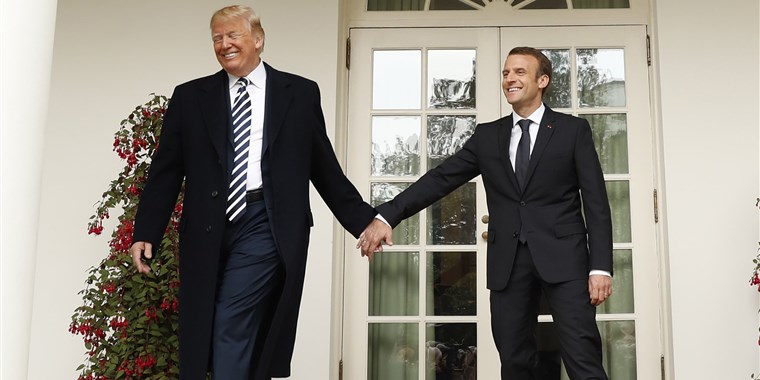 For Emmanuel Macron, capturing Trump's heart risked turning the rest of the world's stomachs. But somehow, with the suave moves of an amorous fictional Frenchman, he pulled it off. Of course, this romance was driven by cold calculation. And that was the secret of Monsieur Macron's success. He wanted to prove he is, in fact, the Trump whisperer, capable of coaxing Trump away from his worst instincts. More specifically, Macron wanted to persuade Trump not to tear up the Iran nuclear deal, not to remove US forces from Syria, and to return the United States to the Paris Agreement on climate change.
For Emmanuel Macron, capturing Trump's heart risked turning the rest of the world's stomachs. But somehow, with the suave moves of an amorous fictional Frenchman, he pulled it off. Of course, this romance was driven by cold calculation. And that was the secret of Monsieur Macron's success. He wanted to prove he is, in fact, the Trump whisperer, capable of coaxing Trump away from his worst instincts. More specifically, Macron wanted to persuade Trump not to tear up the Iran nuclear deal, not to remove US forces from Syria, and to return the United States to the Paris Agreement on climate change.
From the moment he arrived, the physicality of his political maneuvers was something to behold. A relationship that started last May with a legendary bone-crushing handshake and continued in Paris with perhaps the longest handshake in recorded history, moved to US soil with a festival of macho touching, with endless, frequently awkward interactions.
The two men competed to see who could touch the other more. There were backslaps and backrubs. Every handshake required a tap with a third hand, a squeeze with a fourth one. There was the unforgettable "dandruff brush off" by Trump, and the "I love this guy," after Macron kissed him following a press conference. The body language detonated all manner of primate behavior analysis. The two were clearly in a competition for dominance. Other experts detected genuine affection. The back rubs appeared to produce some results. He appeared to convince Trump that leaving Syria would open the country to Iran, and by combining Iran and Syria and proposing a "new deal" -- a renegotiation of the nuclear agreement that would, among other things, address Iran's activities in Syria and Yemen -- he left Trump intrigued. "I think we will have a good shot at doing a much bigger, maybe, deal," the President mused in Trumpian syntax, "maybe not deal."
But that was all a means to an end. Trump, who has presided over a historic plummet in international approval for US leadership, wanted to show he has friends and wanted to enlist France's support on the global stage. Macron needed this trip to cement his alliance with Washington, so he could show he is the new leader of Europe.
With Trump in his corner, Macron addressed Congress, the American people and, really, the world. In a rhetorical pirouette, his Wednesday speech delivered a repudiation of much of what Trump stands for.
Macron brought members of Congress -- both houses, both parties -- to their feet, proving that there is common ground in US politics, a surprise to many Americans.
He started by speaking the language of freedom, which resonates in this country. But then he seemed to tacitly refer to Trump when he spoke against nationalism, against fearmongering, against isolationism. Nationalism "can be tempting," he said, "but closing the door to the world ... will not douse but inflame the fears of our citizens." He spoke of the threats to the global order, warning that "what we cherish is at stake. What we love is in danger." He called on the United States to lead the defense of the values and institutions of the free world that it helped promote and defend.
He warned against protectionism, against "securing current industries" rather than "transforming our economies to meet the global challenge."
He admonished on climate change, saying, "There is no Planet B," and adding, "I'm sure, one day, the United States will come back and join the Paris Agreement." He said the United States, along with its allies, needs to lead in the defense of the global order.
The United States, Macron was saying, remains the indispensable nation. And until the president of the United States returns to the role of advocate for human rights, democracy and multilateralism, Macron would be the one nudging the current President in that direction. And if that requires kissing him, praising him, and whispering in his ear, he showed he was up to the task. Courtesy CNN By Frida Ghitis
Women’s Hunt finds the Golden State Killer
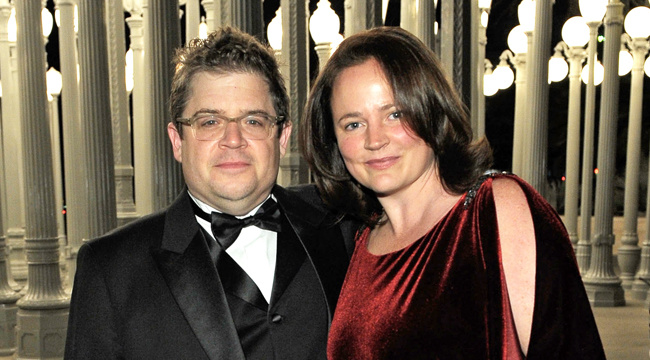 “You did it, Michelle.” Comedian Patton Oswalt proudly and tenderly spoke those words to his late wife in an Instagram video on Wednesday.
“You did it, Michelle.” Comedian Patton Oswalt proudly and tenderly spoke those words to his late wife in an Instagram video on Wednesday.
Finally, an arrest had been made in the case of the Golden State Killer, a moniker Michelle McNamara coined on her personal mission to catch a man responsible for at least 12 killings and 50 rapes throughout California in the 1970s and 80s.
McNamara died in her sleep at 46 in April 2016. She had been in the middle of her hunt for the killer and her book, “I’ll Be Gone in the Dark: One Woman’s Obsessive Search for the Golden State Killer.” Oswalt helped finish the book after McNamara’s death. It became a No. 1 New York Times best-seller.
On Wednesday, authorities announced that a DNA match led them to arrest the Golden State Killer, who they identified as Joseph James DeAngelo, a 72-year-old former police officer. “This is insane,” Oswalt said in another Instagram video when he first learned of the arrest. “Full-tilt freak-out in effect.”
He and McNamara’s fans were crediting the late sleuth’s years of dogged work with helping solve the crime and were disappointed when police didn’t give her credit at a news conference announcing the arrest. Asked specifically about whether McNamara’s book helped solve the case, Sacramento County Sheriff Scott Jones said his office had gotten that question “from literally all over the world in the last 24 hours.” “And the answer is no,” he said. “It kept interest in tips coming in. Other than that there was no information extracted from that book that directly led to the apprehension.”
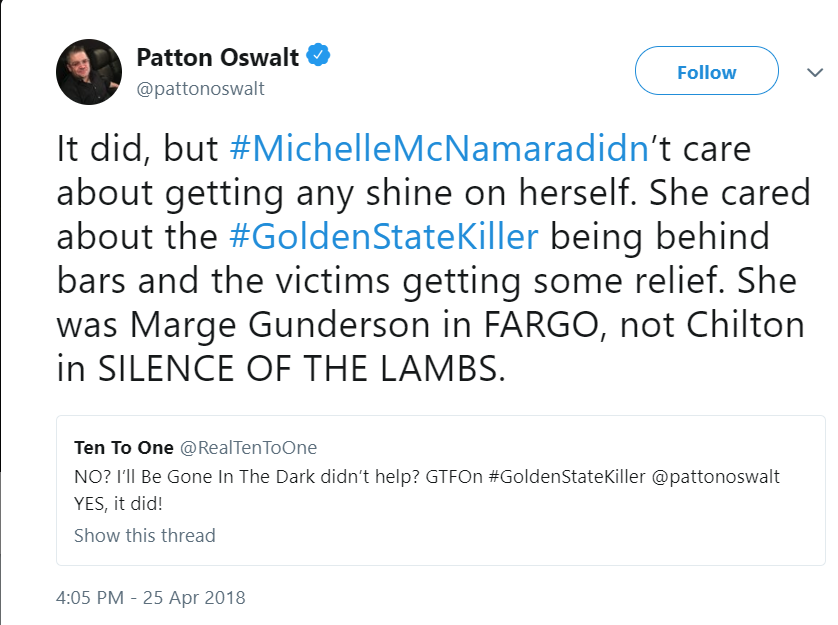 On Instagram, Oswalt said: “Even though the cops are never going to say it, your book helped get this thing closed.”
On Instagram, Oswalt said: “Even though the cops are never going to say it, your book helped get this thing closed.”
McNamara “didn’t care about getting any shine on herself,” Oswalt wrote on Twitter, comparing her to Frances McDormand’s unassuming Detective Marge Gunderson in the 1996 film “Fargo.” “She kept coming at him,” Oswalt said.
Two hours before news broke of the arrest, Oswalt and all of McNamara’s collaborators were together for the first time at an event outside her hometown of Chicago with her family promoting the book. It was also the first day of filming of an HBO documentary series based on the book. “I’m a rational man, but I can’t help but feel this transcends coincidence,” collaborator Paul Haynes wrote on Twitter. Oswalt said he ended the event with a thought about the killer: “He’s running out of time.”
McNamara wrote in her book that she became interested in cold cases as a 14-year-old girl when a neighbor’s murder went unsolved. She also wrote about why and how the Golden State Killer case became her obsession later in life. “The hook for me was that the case seemed solvable,” she wrote. “Curiosity turned to clawing hunger. I was on the hunt.” When DeAngelo was arrested, Sheriff Jones said officers simply waited for him to walk outside his house.
“He was very surprised by that,” Jones said. “It looked as though he might have been searching his mind to execute a particular plan he may have had in mind … but he was not given the opportunity. It happened almost instantly and he was taken into custody without incident at all.”
Oswalt and McNamara’s fans couldn’t help but notice the parallels with DeAngelo’s arrest and how her book ends, with a message directly to the Golden State Killer.
“The doorbell rings,” she wrote. “This is how it ends for you. ‘You’ll be silent forever and I’ll be gone in the dark,’ you threatened a victim once. Open the door. Show us your face. Walk into the light.” Courtesy of AP
Freed - Rapper Meek Mill - Granted Bail Request
Meek Mill walked out of prison Tuesday after Pennsylvania's highest court granted his bail request — but the Philadelphia-born rapper had no intention of lying low. He was ready to celebrate. Mill was released from a prison in Chester — and then whisked away in a helicopter courtesy of Philadelphia 76ers co-owner Michael Rubin, NBC Philadelphia reported. His release at around 6:45 p.m. ET came just in time for him to attend the Sixers playoff game against the Miami Heat, where he rang the ceremonial Liberty Bell replica to wild applause at the Wells Fargo Center. He also sat courtside with Rubin and comedian Kevin
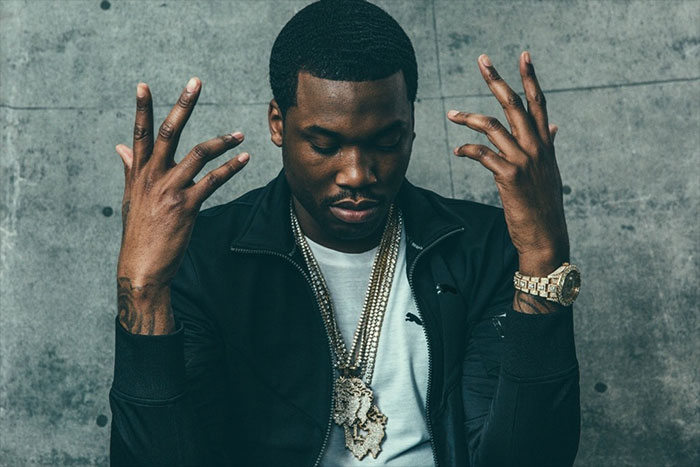 The hip-hop star was in prison after Common Pleas Court Judge Genece Brinkley sentenced him in November to two to four years for a probation violation stemming from a 2008 conviction on drug and firearm charges. In its order Tuesday, the Pennsylvania Supreme Court cited prosecutors' statements that there are "credibility issues with a police officer who was a 'critical witness'" in that initial arrest. Mill, meanwhile, is not yet a free man, and the Philadelphia District Attorney's Office has requested a new trial based on whether that officer's evidence is credible.
The hip-hop star was in prison after Common Pleas Court Judge Genece Brinkley sentenced him in November to two to four years for a probation violation stemming from a 2008 conviction on drug and firearm charges. In its order Tuesday, the Pennsylvania Supreme Court cited prosecutors' statements that there are "credibility issues with a police officer who was a 'critical witness'" in that initial arrest. Mill, meanwhile, is not yet a free man, and the Philadelphia District Attorney's Office has requested a new trial based on whether that officer's evidence is credible.
"I'd like to thank God, my family, and all my public advocates for their love, support and encouragement during this difficult time," tweeted Mill, whose given name is Robert Rihmeek Williams. "While the past five months have been a nightmare, the prayers, visits, calls, letters and rallies have helped me stay positive."
Last week, the District Attorney's office said charges from that 2008 case should be vacated over questions about the officer, who has since retired from the Philadelphia police force. Another former officer who took part in Mill's arrest said the officer lied under oath during the rapper's trial, according to a court affidavit. Philadelphia prosecutors reaffirmed their support Tuesday for a new trial.
"As our office has made clear in recent court filings, the Pa. Supreme Court's decision on Meek Mill being released on bail is consistent with the position of the Philadelphia District Attorney’s Office," prosecutors said. Mill's attorney, Joe Tacopina, said in a statement that the rapper was "unjustly convicted" and would be pushing in the court for his permanent freedom. "Meek is excited to be reunited with his family, and we, along with Meek, intend to continue to shine the light on a justice system in need of reform to prevent any other citizen from being put through what Meek has endured," he said.
Other artists have demanded Mill's case be reexamined. In a November op-ed piece for The New York Times, rapper Jay-Z highlighted Mill's plight as "just one example of how our criminal justice system entraps and harasses hundreds of thousands of black people every day." Jay-Z reiterated on Facebook on Tuesday night that Mill was "caught in a probation trap for years by a broken system."
After serving eight months for the initial conviction, Mill had been on probation. He was arrested twice last year: Once for allegedly popping a wheelie on a motorcycle in New York City, and then for a separate altercation at a Missouri airport. Both charges were dismissed, but he was still found in technical violation of his probation.
Mill on Tuesday also thanked Philadelphia prosecutors but tweeted he is not alone in his struggle. "I understand that many people of color across the country don't have that luxury and I plan to use my platform to shine a light on those issues," Mill wrote. He said he plans to fight to "overturn" his conviction in court. Courtesy of NBC News
Yale Teaches Happiness Classes
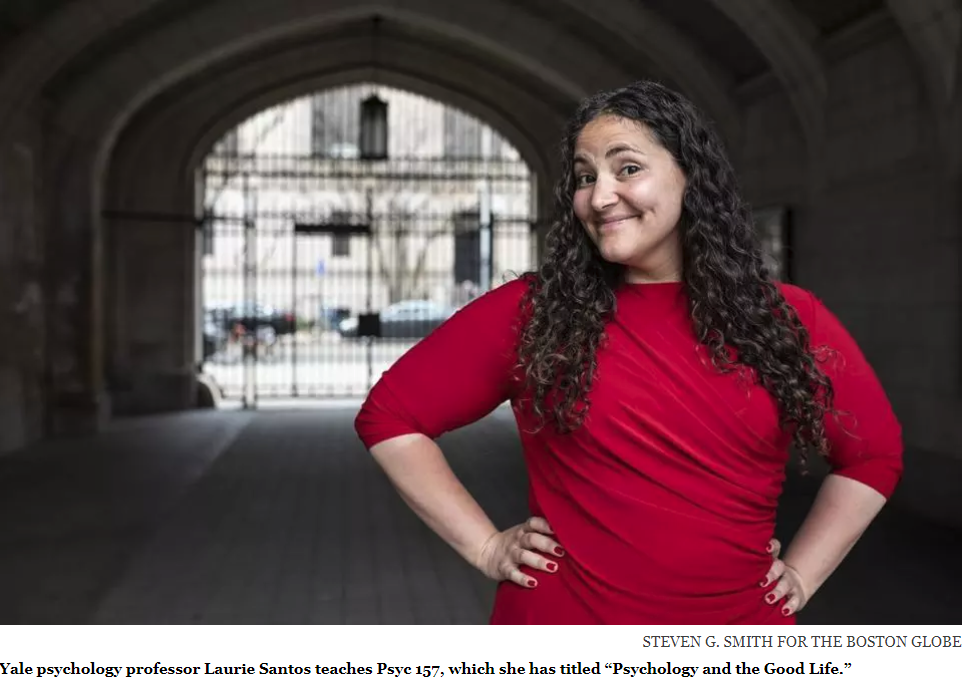 When Laurie Santos was growing up in New Bedford, her mother was a high school guidance counselor, which meant Santos got lots of good advice about school as well as about life.
When Laurie Santos was growing up in New Bedford, her mother was a high school guidance counselor, which meant Santos got lots of good advice about school as well as about life.
Years later, when Santos became a psychology professor at Yale University, she noticed that her students seemed to be neglecting the latter. Their academics were solid (there was a reason they had been accepted to Yale), but the amount of pressure they put on themselves was wrecking their stress levels, their mental health, their sleep, and, ultimately, their happiness.
“I wanted to yell at them: ‘God, chill out!’ ” she said. Instead, she created a class for them, one that is now the most popular in the history of the 317-year-old Ivy League school. The course, Psyc 157, is titled “Psychology and the Good Life,” but everyone at Yale calls it “the happiness class.” Some 1,200 students enrolled when the course was unveiled this semester. That is nearly a quarter of Yale’s undergrads.
The story of how Santos, 42, transitioned from studying how nonhuman primates interact — her research specialty — to undergrad happiness began in earnest two years ago when she became the head of Silliman College, one of 14 residential houses at Yale. She and her husband moved into an apartment at the college, and Santos found herself assuming the role of den mother to nearly 488 students, many of them making the mistake of thinking they will find happiness in external circumstances. Getting a good grade, the evidence showed, would not change unhappy. “So I brought together work on positive psychology and behavior change, then put it into an applied form to create the class,” Santos said. “The goal was to rewire the way the students viewed the pursuit of happiness.” The success of the class has been unprecedented. So many students signed up that the meeting space had to be moved to Woolsey Hall, a cavernous, cathedral-like auditorium typically used for things like symphony concerts. The sheer volume of students requires two dozen teaching fellows.
Jennifer
“Two students in front of me just started crying,” she said. Students went in groups to campus museums they’d never entered. They made new friends. And then Mother Nature extended the experiment. A snowstorm was on the way, and Yale canceled school for the following day. Many of the students stayed together all through the night.
“We know from psychology that the top key to happiness has to do with intentional social interactions,” Santos said. “Very happy people spend time with other people.” Santos’ teachings are now going beyond the walls of Yale. A Santos-led course called “The Science of Well-Being” is available on the website coursera.org, complete with video lectures and reading assignments. In the month since it’s been available, a Yale spokesman said, it has been taken by 78,000 people in more than 168 countries, making it the most popular online course launch in school history.
But getting the information out there is one thing. Absorbing it in a way that changes behavior and thinking for the better is another thing entirely. Santos calls it “the GI Joe Fallacy,” after the 1980s cartoon. “GI Joe always said: ‘Now you know, and knowing is half the battle.’ That is simply not true,” she said. She said recent research suggests that simply knowing something — how to be happy, for instance — is a shockingly small part of the mind’s battle to make decisions that lead to happiness. “You have to set up better situations,” she said. “You don’t get it for free just by knowing something.” To that end, she said she tries to practice what she preaches. And, she said, she fails often. (Her husband jokingly documents her failures.)
On a recent afternoon, Santos’ students gathered in Woolsey Hall for lecture No. 18, this one focused on being “slaves to our habits,” which addressed the use of positive cues as a way to hack those habits for a huge impact on behavior and happiness. As Santos prowled the grand stage, wearing a wireless mic, with a huge screen behind her and an audio/visual tech running the show from the back, it was more TED Talk than a traditional lecture. Some students took diligent notes. Others stared off into space or their phones. But perhaps most notable was who wasn’t there. About 1,000 students. Only about 200 undergrads had shown up for the lecture. Attendance, students in the class said, had fallen dramatically after their mid-term exam.
Where were the rest? Maybe they were practicing time affluence. Perhaps they were working on their final project, which is to implement an intervention — such as regular meditation — and then write about it. Or maybe they had finally accepted the fact, as Santos had told them, that good grades would not make them happy. Courtesy of the Boston Globe and Billy Baker [email protected].






